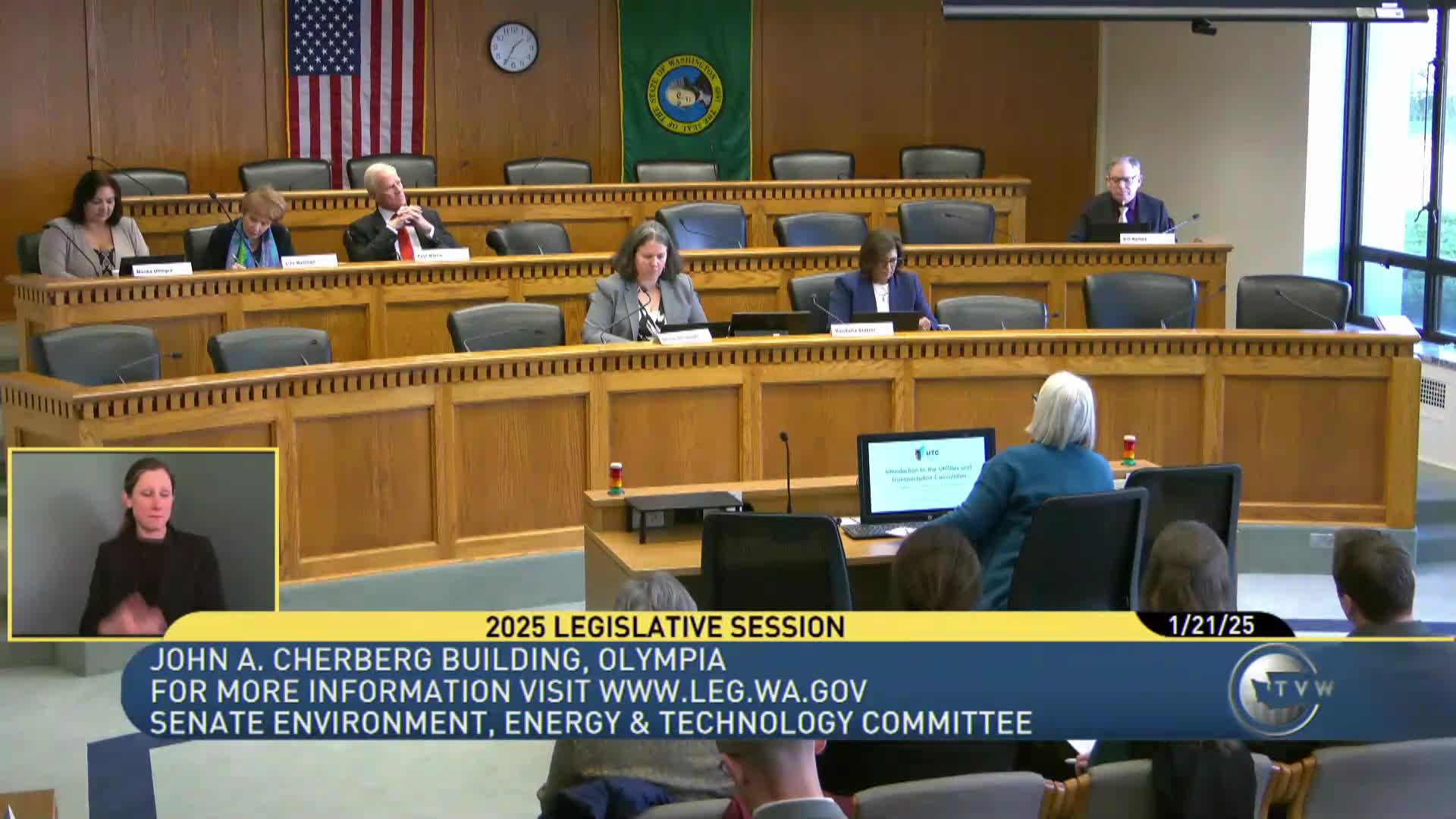UTC commissioner outlines scope: rates, safety, pipeline oversight and regional market work
Get AI-powered insights, summaries, and transcripts
Subscribe
Summary
A Utilities and Transportation Commission commissioner told the Senate Energy, Environment and Technology Committee the agency regulates private investor‑owned electric, gas and selected transportation companies, enforces safety delegated by federal agencies and is heavily engaged in emerging regional energy markets and reliability efforts.
Anne Rendell, a commissioner at the Utilities and Transportation Commission, told the Senate Energy, Environment and Technology Committee that the agency’s core responsibilities are to ensure private investor‑owned utilities and transportation companies provide service that is “fairly priced, available, reliable, safe, and equitable.”
The commission regulates investor‑owned electric utilities (Avista, Pacific Power and Puget Sound Energy), several natural‑gas distribution companies (including Cascade Natural Gas and Northwest Natural), and certain private water and transportation carriers. Rendell said the UTC does not regulate municipal utilities, broadband or mobile telecommunications service; the Federal Communications Commission retains authority for internet and mobile services.
The commission’s role matters because it sets and reviews company rates, conducts safety inspections and enforces consumer protections. Rendell said UTC operates as a quasi‑judicial agency: larger cases are adjudicated with testimony, cross‑examination and briefs, while staff handle smaller adjudications and customer assistance. She described the agency’s technical staff of roughly 170 people—accountants, economists, engineers, inspectors and attorneys—and said the commission is funded primarily by regulatory fees paid by the industries it regulates rather than the state general fund.
Rendell described several delegated federal safety roles: pipeline safety inspections are performed under delegation from the Pipeline and Hazardous Materials Safety Administration (PHMSA); railroad safety inspectors operate under delegation from the Federal Railroad Administration (FRA); and motor carrier safety follows Federal Motor Carrier Safety Administration (FMCSA) standards. She said the pipeline program typically qualifies for federal reimbursement (PHMSA can reimburse up to 80% of state program costs; UTC historically receives about 60% of eligible funding) and noted the commission also administers the state’s participation in the federal unified carrier registration (UCR) system.
Rendell walked committee members through other UTC jurisdictional limits: the commission regulates only private water companies with more than 100 service connections or specific charge thresholds; the agency’s telecommunications jurisdiction is limited to landline service; and municipal gas utilities are set by city governing bodies and are not subject to UTC rate setting, though UTC works with municipalities on safety matters.
She described regional energy work as “extracurricular” but important: UTC staff and commissioners participate in Western market efforts such as California’s extended day‑ahead market (EDAM), the Southwest Power Pool (SPP) Markets+ initiative and the Western Resource Adequacy Program. Rendell said those engagements are time‑intensive and that the commission is actively developing rules to implement statutes and state policy, including CETA (the Clean Energy Transformation Act), community choice aggregation (CCA) matters, integrated system planning and equity implementation under state guidance.
On customer billing and the Climate Commitment Act (CCA), Senator Harris asked whether UTC requires separate bill line items for CCA or other charges. Rendell said the commission has discretion and has sometimes preserved the historical bill presentation used by utilities; she added that when a utility files a new tariff the commission can review whether items should be broken out. On municipal gas utilities, Rendell confirmed the commission does not set those cities’ rates but does engage on safety oversight.
Rendell emphasized the commission’s consumer assistance role—helping customers with billing questions, recovering overpayments and pursuing statutory complaints when necessary—and noted several pending adjudications, including rate and company complaints. She closed by saying the Washington UTC is actively engaged at the regional and national level and that commissioners and staff participate in multiple national advisory groups.
The committee followed with several technical questions; Rendell provided clarifications on jurisdictional limits, funding sources and the commission’s statutory adjudicative process.
Ending: Committee members thanked Rendell for the overview and moved to the next presentation.
